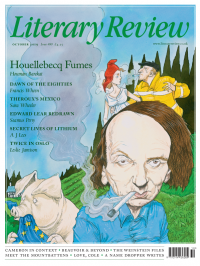Donald Rayfield
Madness & Misanthropy
Bellevue
By Ivana Dobrakovová (Translated by Julia & Peter Sherwood)
Jantar 219pp £12
Big Love
By Balla (Translated by Julia & Peter Sherwood)
Jantar 126pp £10
No nation in Europe today is as good at self-deprecation as the Slovaks: they claim to be victims of modern kleptocracy, helplessly in thrall to psychotherapy, alcohol, European mercantilism and a depraved pop culture. Until thirty years ago, a typical Slovak novel had a wise beekeeper and a virtuous matriarch as its heroes, their values surviving both wartime fascism and postwar communism. But even before the end of communist rule, existential despair was breaking through – notably in the very fine novels of Ján Johanides, unfortunately still untranslated, and in the iconoclastic novellas of the cynical and sexually obsessed Peter Pišt’anek, who died in 2015. Slovak writers of the present generation are as cosmopolitan as they are Slovak. They tend to be familiar with the main languages of western Europe; formerly yoked into a single country with the Czechs, they have shaken off their inferiority complex, together with Czech lugubriousness. Rather like the Scots in respect to the English, their literature cocks an anarchic snook at their former Czech masters.
Ivana Dobrakovová is well known in her native Slovakia as a translator of Elena Ferrante. In Bellevue she shows even greater ability than Ferrante to get into the mind of a rebellious adolescent girl. Blanka, bored with her student boyfriend who does nothing but revise for his Spanish exam and eat bread and jam, takes a volunteer summer job, working with a mixed bunch of Europeans as a carer in a Marseille centre for the disabled. She clearly has no vocation and is very soon overwhelmed, first by dislike of the disabled, then by a paranoiac conviction that the disabled hate her in return. Her ensuing psychotic episode is described so convincingly (though perhaps with more than enough information about bodily fluids) that the reader will wonder if Dobrakovová did not just imagine the breakdown but actually experienced it. Yet few people who have a breakdown as severe as Blanka’s would be able to recall every stage, every hallucination, every mood swing with such graphic precision. All the other characters, such as an Algerian woman and a Slovene youth, are judged through Blanka’s eyes, now needy, now hostile, so that there are no villains or heroes in the novel, only fellow carers, more or less indifferent or well disposed to this awkward teenager. What eventually emerges is a picture, faintly reminiscent of a Camus novel, of a northerner’s alienation in a southern landscape, as well as a plausible portrayal of the carer’s dilemma: how to protect oneself from the mood and even the fate of those you care for.
Balla (as an author he dispenses with his first name, Vladimír) is a more established writer in Slovakia. Perhaps because he holds on to a mundane office job while writing stories about lost male souls, he is often referred to as the Slovak Kafka. (In fact the most Kafkaesque of the two works reviewed here is Bellevue, in which Blanka in her madness sees a beetle on the wall and thinks, ‘is it you, Gregor?’) Andrič, the unheroic protagonist of Big Love, which is more a novella than a novel, is unhappy playing happy families for short periods with his very normal girlfriend, Laura, her daughter and her irritatingly trendy mother; he is equally unhappy with his mediocre beer-drinking colleagues. He takes no action to resolve this state of affairs, merely provoking Laura into putting her foot down. Resentful, argumentative and self-centred, Andrič evokes none of the sympathy that Kafka’s victims of family, fate and bureaucracy arouse. But he is witty in his observations. Many of the short chapters could easily be refashioned into five-minute scripts for stand-up comics. Why the novella is called Big Love is unclear: the Slovaks’ ‘Big Love’ has traditionally been for their country, which they have for centuries seen as an island of religious conviction and Slavic values, fighting against power-crazed Germans and maniacal Hungarians. Certainly this ‘Big Love’ has nothing erotic or interpersonal about it.
What makes Big Love significant is the clarity of Balla’s writing and the eloquence with which the protagonist damns and belittles himself. But the key role in making Balla’s – and Dobrakovová’s – fiction so readable for a British audience is played by the translators, Julia and Peter Sherwood. With their linguistic skills and perfect pitch, they have done as much for the international reputation of Slovak prose as any single Slovak writer.

Sign Up to our newsletter
Receive free articles, highlights from the archive, news, details of prizes, and much more.@Lit_Review
Follow Literary Review on Twitter
Twitter Feed
Under its longest-serving editor, Graydon Carter, Vanity Fair was that rare thing – a New York society magazine that published serious journalism.
@PeterPeteryork looks at what Carter got right.
Peter York - Deluxe Editions
Peter York: Deluxe Editions - When the Going Was Good: An Editor’s Adventures During the Last Golden Age of Magazines by Graydon Carter
literaryreview.co.uk
Henry James returned to America in 1904 with three objectives: to see his brother William, to deliver a series of lectures on Balzac, and to gather material for a pair of books about modern America.
Peter Rose follows James out west.
Peter Rose - The Restless Analyst
Peter Rose: The Restless Analyst - Henry James Comes Home: Rediscovering America in the Gilded Age by Peter Brooks...
literaryreview.co.uk
Vladimir Putin served his apprenticeship in the KGB toward the end of the Cold War, a period during which Western societies were infiltrated by so-called 'illegals'.
Piers Brendon examines how the culture of Soviet spycraft shaped his thinking.
Piers Brendon - Tinker, Tailor, Sleeper, Troll
Piers Brendon: Tinker, Tailor, Sleeper, Troll - The Illegals: Russia’s Most Audacious Spies and the Plot to Infiltrate the West by Shaun Walker
literaryreview.co.uk